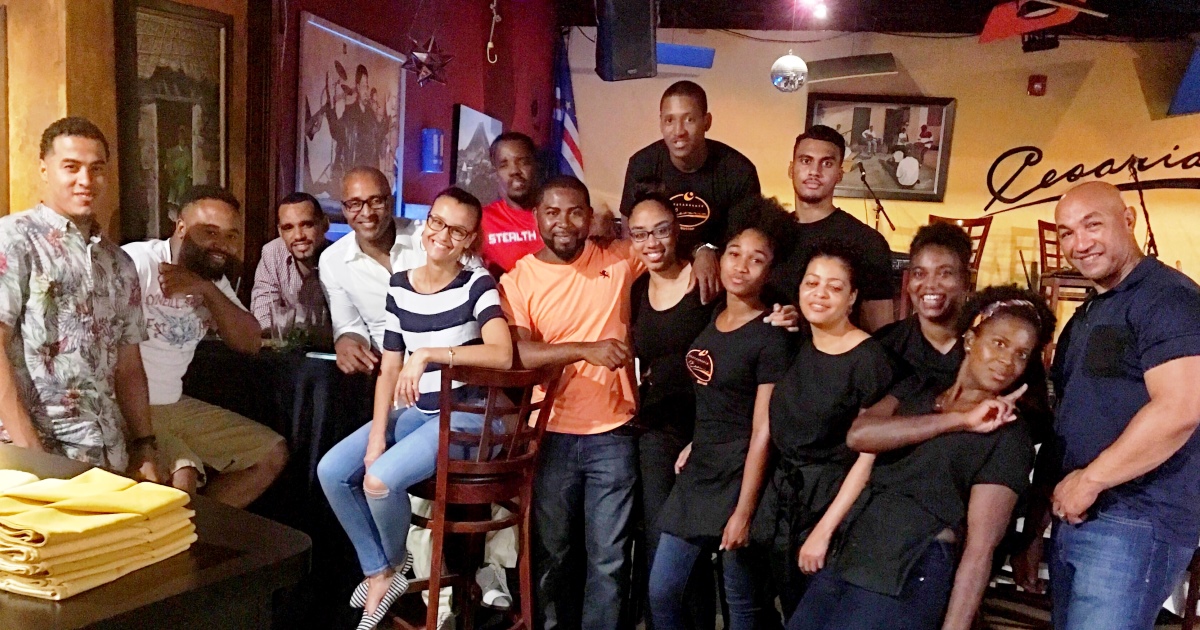Owners and staff at Restaurante Cesaria. Courtesy of Restaurante Cesaria.
When eight-year-old Antonio (Tony) Barros emigrated from the Cape Verde islands in 1978, there weren’t many Cape Verdeans in Boston. Barros recalled how there were “little pockets of Cape Verdeans in different sections of the city,” but no central gathering place. Years later, Barros, along with Jose Fonseca-Brandao and two other partners, saw a need and an opportunity. In 2002, they opened Restaurante Cesaria on Bowdoin Street, one of the city’s first Cape Verdean restaurants.
By this time, there was a growing Cape Verdean population in north Dorchester, but still relatively few public gathering places for the migrant community. Co-owner Fonseca-Brandao, who emigrated from Cape Verde in 1984, explained, “we brought with us a little piece of Cape Verde to this neighborhood…. most every food, music, conditions you can get there, we try to bring it here.”
Although the founders chose the restaurant’s Bowdoin Street location for its large stage and kitchen, Cesaria would soon benefit from its location in a Boston Main Streets district, an initiative started by former Mayor Thomas Menino to encourage commercial development in the neighborhoods. A year after the restaurant’s founding, Cesaria received storefront improvements as part of this program.
Restaurante Cesaria is named after the legendary Cape Verdean singer, Cesaria Evora, who often came to dine at the restaurant after her shows in the Boston area. Live music was part of the plan for the restaurant, and soon morna, a folk music style sung in Cape Verdean creole, was being performed several nights a week. A long list of popular artists from the islands have visited and performed at the restaurant, making the venue well known globally.
Beyond musical entertainment, patrons can enjoy traditional Cape Verdean dishes, prepared by native chefs. The restaurant serves a mix of traditional Cape Verdean food: meat and seafood prepared as it is on the islands, the staple stew katchupa, and popular drink recipes. Meals are affordably priced, and concert tickets include a dinner buffet. The owners noted that most necessary ingredients could be purchased stateside, but others were imported from Portugal or the islands. The restaurant’s Cape Verdean chefs attract a large clientele, and many of the staff are also first or second-generation Cape Verdeans.
Perhaps most importantly, the restaurant has crafted a strong sense of community among Cape Verdean immigrants. Based on their own experiences with culture shock, language and education barriers, Barros and Fonseca-Brandao often advise newcomers on how to navigate their new lives in America. They pride themselves on serving as “the embassy of Cape Verde” for new arrivals. Indeed, patrons often come straight from the airport to the restaurant to connect with members of the Dorchester community.
Since the restaurant has been in business, the owners have tailored advice to each individual, making them feel at home. In addition, they often holds fundraisers for needs in the community, such as illnesses, and provide employment for many first- and second-generation Cape Verdeans.
Cesaria’s efforts appear to be paving the way for a tight-knit, successful community. Fonseca-Brandao remarked, “Being this long in the community, we’ve seen young Cape Verdeans become leaders…. a lot of young people graduate from great colleges and become great professionals.” Alongside their efforts with the younger generation, Fonseca-Brandao reports that Cesaria is a meeting point within walking distance for many of the elderly Cape Verdeans in the neighborhood. Often, these patrons enjoy meals together all day on Sundays; “you find all ages, it’s very family oriented.”
Given rising housing prices in Boston, some of Cesaria’s patrons have been moving out of the city to places like Brockton, but they still return periodically to enjoy the food and music. The restaurant also attracts visitors with ties to the islands that come from around the world, as well as neighboring New England states. In this way, the restaurant has become a crossroads of the Cape Verdean diaspora, as well as a pillar of Boston’s largest Cape Verdean community.
–Amanda Judah, Boston College ’20.
Works Cited
Hong Tran. “Cape Verdean Cuisine Finds Home in Dot,” Dorchester Reporter, July 2, 2014.
Interview with Antonio Barros and Jose Fonseca-Brandao by Amanda Judah, Dorchester, MA, November, 2018.
Pires, Jessica F., “Uphams Corner and ‘Other’ Spaces: Racialized Youth Identities in Boston’s Cape Verdean Community,” Senior Honors Thesis, Colby College, Digital Commons, 2013.
Restaurante Cesaria website.


